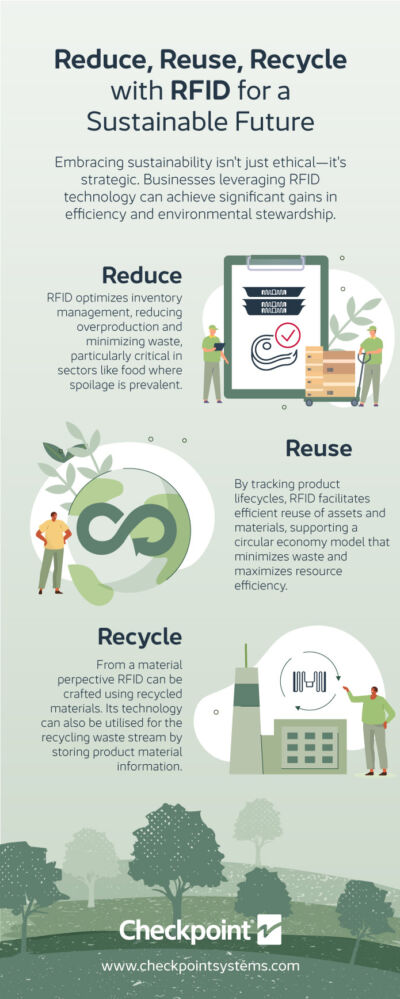保点新闻
保点RFID解决方案助力全球循环经济,实现零售可持续未来
Checkpoint 保点的RFID库存管理被广泛用于资产管理、跟踪,甚至是人员的合理规划。除这些传统的RFID应用以外,RFID库存管理也是帮助企业实现资源合理化应用、减少生态环境污染的关键工具之一。保点供应链RFID解决方案助力企业开拓完整的生产供应链可视化,确定每个环节均可被追溯,践行全球标准化绿色循环经济。
Sustainability is not just a responsibility but a smart strategy to increase performance, transparency, and long-term business resilience. By integrating sustainable practices into their overall strategy, managing environmentally friendly supply chains, and complying with environmental regulations, companies can turn challenges into opportunities. While it may seem daunting, those willing to adapt can thrive in a more sustainable world.
RFID technology can be a key factor in companies’ adaptation to this growing environmental concern. Traditionally, RFID has been used to track and manage inventories, assets, and even people. However, beyond its conventional applications, RFID for a more sustainable world is emerging as a crucial tool through the principles of reduce, reuse, and recycle.
In this article, we will explore how RFID technology can help companies minimize waste, and improve reuse.
Reduce: The Key to Minimizing Waste and Improving Efficiency
One of the main benefits of RFID is waste management. This technology provides accurate, real-time data on inventory levels, helping businesses make informed decisions to avoid overproduction and reduce excess stock.
Implementing RFID technology is crucial, particularly in the food sector. According to the FAO (2019), globally, 14% of food, with an estimated value of USD 400 billion, is lost between harvest and distribution.
Another 17% is wasted in distribution and among final consumers (UNEP, 2021). Implementing RFID technology in food trade processes can lead to a significant reduction in food waste. By ensuring accurate stock levels and timely restocking, RFID helps maintain optimal inventory, reducing spoilage and waste.
To contribute to resource reduction from the production of RFID tags, Checkpoint created the Vortex tag, which, compared to the Zephir tag, shows an approximate size reduction of 56.8%. This smaller size means less material is used in each tag, demonstrating significant material reduction without compromising functionality and contributing to overall waste reduction.
Reuse: Essential for the Environment
RFID can also be utilized for product reuse. By holding data on how to repair, options for reuse, and also recycling of product components – RFID can be utilized to drive a more circular economy. This capability is especially beneficial in sectors like retail, restaurants and hospitality, where products and materials are frequently reused.
The circular economy is a model that seeks to eliminate waste and pollution, keep products and materials in use, and regenerate natural systems. Legislation is becoming increasingly stringent, requiring companies to adopt practices that reduce waste, increase reuse, and improve recycling.
For example, at Checkpoint, we worked on a project for a major fast-food company that involved implementing RFID labels, hardware, and software in their restaurants in France. This helped to reduce their waste and provided unparalleled real-time visibility of reusable plastic packaging, allowing for quick and efficient inventory management and optimizing provisioning to ensure long-term use and safety of stock. This company recently used RFID to collect and reuse tableware, further demonstrating the solution’s effectiveness.

RFID offers a comprehensive answer to some of the most urgent environmental challenges. By adopting RFID, companies can make significant progress toward a more sustainable future, characterized by efficient resource management, waste reduction, and better recycling and reuse practices. Integrating RFID for sustainable world is a necessary step to achieve long-term operational excellence.